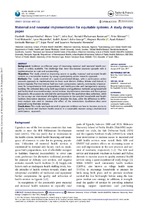Maternal and neonatal implementation for equitable systems. A study design paper
Date
2017Author
Ekirapa-Kiracho, Elizabeth
Tetui, Moses
George, Asha S.
Metadata
Show full item recordAbstract
BACKGROUND: Evidence on effective ways of improving maternal and neonatal health outcomes
is widely available. The challenge that most low-income countries grapple with is
implementation at scale and sustainability.
OBJECTIVES: The study aimed at improving access to quality maternal and neonatal health
services in a sustainable manner by using a participatory action research approach.
METHODS: The study consisted of a quasi-experimental design, with a participatory action
research approach to implementation in three rural districts (Pallisa, Kibuku and Kamuli) in
Eastern Uganda. The intervention had two main components; namely, community empowerment
for comprehensive birth preparedness, and health provider and management capacitybuilding.
We collected data using both quantitative and qualitative methods using household
and facility-level structured surveys, record reviews, key informant interviews and focus group
discussions. We purposively selected the participants for the qualitative data collection, while
for the surveys we interviewed all eligible participants in the sampled households and health
facilities. Descriptive statistics were used to describe the data, while the difference in difference
analysis was used to measure the effect of the intervention. Qualitative data were
analysed using thematic analysis.
CONCLUSIONS: This study was implemented to generate evidence on how to increase access to
quality maternal and newborn health services in a sustainable manner using a multisectoral
participatory approach.

